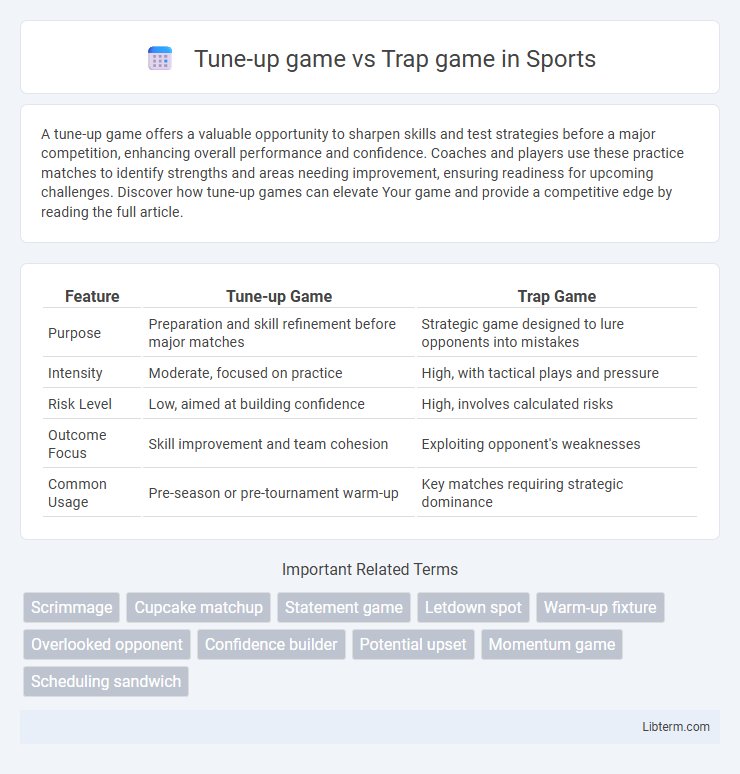A tune-up game offers a valuable opportunity to sharpen skills and test strategies before a major competition, enhancing overall performance and confidence. Coaches and players use these practice matches to identify strengths and areas needing improvement, ensuring readiness for upcoming challenges. Discover how tune-up games can elevate Your game and provide a competitive edge by reading the full article.
Table of Comparison
| Feature | Tune-up Game | Trap Game |
|---|---|---|
| Purpose | Preparation and skill refinement before major matches | Strategic game designed to lure opponents into mistakes |
| Intensity | Moderate, focused on practice | High, with tactical plays and pressure |
| Risk Level | Low, aimed at building confidence | High, involves calculated risks |
| Outcome Focus | Skill improvement and team cohesion | Exploiting opponent's weaknesses |
| Common Usage | Pre-season or pre-tournament warm-up | Key matches requiring strategic dominance |
Understanding Tune-Up Games: Purpose and Importance
Tune-up games serve as strategic preparation matches that help teams assess strengths, identify weaknesses, and refine tactics before facing critical opponents. Their primary purpose is to build confidence, improve team cohesion, and simulate competitive scenarios without the pressure of official rankings or standings. Understanding the importance of tune-up games enables coaches to optimize player performance and increase the likelihood of success in subsequent trap games, where unexpected challenges and heightened stakes prevail.
What Defines a Trap Game?
A trap game in sports occurs when a higher-ranked team faces an opponent perceived as weaker, creating the risk of underestimating the competitor and losing focus. These games are defined by psychological pressure, unexpected performance from the underdog, and the challenge of maintaining intensity despite presumed superiority. Unlike tune-up games, trap games demand strategic preparation to avoid complacency and ensure execution under pressure.
Key Differences Between Tune-Up and Trap Games
Tune-up games are designed to prepare teams by focusing on skill refinement, strategy testing, and gaining competitive rhythm before major matches, often facing lower-tier opponents. Trap games pose a higher risk of unexpected losses due to underestimating lesser-known or weaker teams, which can disrupt momentum and confidence during the regular season. The key difference lies in the purpose and mindset: tune-up games serve as deliberate practice opportunities, while trap games require heightened awareness to avoid complacency against underestimated opponents.
Common Examples of Tune-Up Games in Sports
Common examples of tune-up games in sports include pre-season basketball matches where teams test new strategies and player lineups without the pressure of regular season stakes. In football, friendly matches or scrimmages serve as tune-up games to improve coordination and assess player fitness before competitive play. Baseball spring training games also function as tune-up games, allowing players to refine skills and build team chemistry ahead of the official season.
Notorious Trap Games: Lessons from the Past
Notorious trap games like the 1983 NFL playoff clash between the Seattle Seahawks and Miami Dolphins reveal how underestimated opponents exploit weaknesses through strategic deception. These historic games emphasize the critical importance of preparation and adaptability in avoiding costly surprises that can derail even the most promising seasons. Analyzing past trap games provides valuable lessons on resilience and the need to anticipate unexpected challenges in competitive environments.
Psychological Factors Influencing Tune-Up and Trap Games
Psychological factors significantly influence performance in tune-up games versus trap games by affecting player focus and risk perception. Tune-up games often generate lower anxiety, allowing athletes to mentally rehearse strategies and build confidence before high-stakes encounters. In contrast, trap games can induce overconfidence or complacency, disrupting preparation and leading to suboptimal performance due to underestimating opponents.
Strategies Coaches Use for Tune-Up Game Preparation
Coaches use tune-up games to finalize team strategies and assess player performance under competitive conditions without the high stakes of a trap game. Emphasis is placed on experimentation with lineups and play-calling to identify strengths and weaknesses, ensuring adjustments are made before facing critical opponents. Detailed film analysis and situational drills during practice reinforce lessons learned from the tune-up game, enhancing readiness for more strategically challenging trap games.
Warning Signs a Match Could Become a Trap Game
A trap game often features warning signs such as underestimating the opponent's defensive strategy, overconfidence from a recent win, and significant roster changes that disrupt team chemistry. Key indicators include unexpected injuries or absences of key players, playing on unfamiliar fields, and the opponent's heightened motivation to upset a favored team. Recognizing these warning signs helps coaches and players adjust strategies to avoid the pitfalls of a trap game.
Impact of Scheduling on Tune-Up and Trap Game Outcomes
Tune-up games typically offer teams an opportunity to refine strategies and build confidence against less competitive opponents, often resulting in improved performance in subsequent high-stakes matches. Trap games, characterized by underestimated opponents or unfavorable conditions, frequently lead to unexpected losses and disrupt team momentum due to complacency or inadequate preparation. Scheduling that balances competitive challenges with strategic rest enhances tune-up game benefits while mitigating the risk of trap game upsets by maintaining focus and readiness.
How Teams Can Avoid Falling into the Trap Game Mindset
Teams can avoid falling into the trap game mindset by maintaining consistent preparation routines regardless of the opponent's perceived strength and emphasizing focus on executing fundamental strategies. Coaches should encourage treating each game with equal importance to prevent underestimating so-called "trap" opponents, which often leads to complacency. Utilizing detailed film study and maintaining high mental intensity ensures players remain engaged and ready to perform at their best in every matchup.
Tune-up game Infographic

 libterm.com
libterm.com